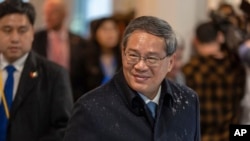Chinese Premier Li Qiang will touch down in Australia Saturday, becoming the most senior Chinese visitor in over seven years.
His arrival symbolizes the greatly improved relationship between Beijing and Canberra, following a turbulent patch that saw China impose tough trade restrictions on Australia.
Li will land in the South Australian city of Adelaide, before heading to Canberra for a meeting with Australian Prime Minister Anthony Albanese. He will wrap up his trip with a visit to Perth.
While trade ties will dominate much of the agenda, Australian analysts say they see the visit of China's second most powerful official as a crucial step on the return to more normal relations.
"This visit signals that the bilateral relationship has reached a new settling point, after many, many years of a huge amount of sound and fury and drama and tension," Benjamin Herscovitch, a research fellow at the Australian National University, told VOA.
"We're now reaching this new settling point of a rough, uneasy normalization of the relationship between Australia and China," Herscovitch said.
The roots of the breakdown of relations between Canberra and Beijing can be traced to 2018, when Australia became the first country to ban Chinese telecommunications giant Huawei from its 5G network.
Two years later, Albanese's predecessor, Scott Morrison, angered China when he led calls for an international investigation into the origins of COVID-19.
As the relationship soured, China slapped a host of tariffs and restrictions on a variety of Australian goods and commodities including barley, wine and coal. The sanctions are estimated to have cost the Australian economy over $13 billion.
"China's strategy did not just impose trade restrictions in the form of various different measures that were economically coercive, but also denied Canberra diplomatic access to Beijing," Herscovitch said.
"This was essentially part of a punishment campaign for Australia," he added.
Beijing was further irked by Australia's enhanced military ties with Western countries, including a new AUKUS security alliance which was announced with the United States and the United Kingdom in 2021.
The partnership will allow Australia to acquire nuclear submarine capability, specifically to counter growing concerns over China's ambitions in the Indo-Pacific region.
These tensions led to an almost total breakdown in diplomatic relations between Australia and China.
The formation of a new Australian government in 2022 provided an opportunity for a fresh start, with Albanese keen to resume dialogue with Australia's biggest trading partner.
His meeting with Chinese President Xi Jinping at the G20 in Bali later that year, opened the door to the resumption of high-level talks, with Australian Foreign Minister Penny Wong visiting Beijing just a month after that summit.
Further progress was made when Albanese traveled to China last November, paving the way for the resumption of annual leaders' meetings.
"It's a significant sign that the Australian government has reached its goal of 'stabilising' relations," Melissa Conley Tyler, an honorary fellow at the University of Melbourne's Asia Institute, said.
"During this visit, messaging will be around Australia as a country that is 'friendly' to China - which makes a difference to officials, importers and parents choosing where their children will study," Tyler told VOA.
Li's visit will take in three Australian states, providing plentiful opportunities for handshakes and photo opportunities, although analysts are less certain of more substantial results aside from diplomatic goodwill.
"It is unlikely the visit will yield any major announcements – both sides have been careful to stress throughout these types of exchanges that dialogue is in itself the focus and the achievement," Elena Collinson, head of analysis for the Australia-China Relations Institute at the University of Technology Sydney, said.
One area that could see a breakthrough is the removal of Chinese trade restrictions on Australian lobster.
As relations improved under the Albanese administration, Beijing rolled back almost all of the trade barriers that had been erected against Australia, but a ban on live lobster imports remains.
It is widely expected that this ban will be reversed, although the timing of any such announcement will be closely watched.
"China will want to say that there has been a scientific, technical resolution of the issue, and therefore they can remove the trade restrictions," Herscovitch said.
"But they wouldn't want it too closely associated with the premier's visit, even though everyone understands that it was a politically motivated trade restriction and so the removal of it is also politically motivated," Herscovitch added.
Beijing's so-called 'panda diplomacy' will be on full display during the trip, with Li set to visit Adelaide Zoo to view Wang Wang and Fu Ni, two pandas that were loaned to Australia in 2009.
The arrangement is set to expire at the end of this year, but it is hoped that Li could announce an extension of their stay in the southern hemisphere.
The premier's trip to the mining hub of Western Australia will also boost hopes of further enhanced trade ties, with Li set to attend a roundtable event organized by the Business Council of Australia. Beijing still relies heavily on Australia for critical commodities including iron ore.
While this visit should further stabilize a recovering diplomatic relationship, the Chinese premier has work to do to gain the support of the Australian public.
Recent polling, partly conducted by the Australia-China Relations Institute, found a high level of anxiety over China's future ambitions.
"Nearly three-quarters of Australians see China as a security threat, while half see military conflict with China within the next three years as a serious possibility," Collinson said.
"While support for the economic dimension of the relationship remains, even this is starting to waver," Collinson added.




